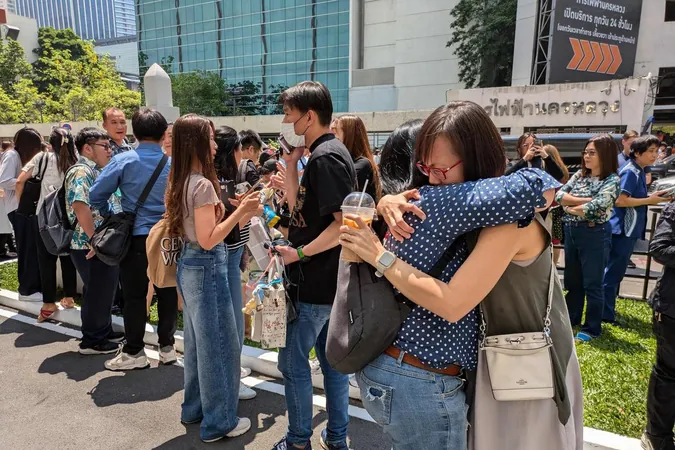
Bangkok in Turmoil: The Aftermath of a Devastating Earthquake
2025-03-29
Author: Wei
On March 28, Bangkok, Thailand’s bustling capital, came to a standstill as a powerful earthquake sent shockwaves through the city, plunging it into chaos and fear. The quake, with a magnitude of 7.1, originated from neighboring Myanmar—about 1,020 kilometers away—forcing city-wide evacuations and leaving thousands stranded for hours.
The tragedy claimed the lives of nine individuals in Bangkok, with eight construction workers perishing when a 33-story building collapsed during the quake. Rescue operations are underway, with emergency teams, backed by sniffer dogs, searching through the rubble for more than 100 missing persons at the site. This represents a grim reminder of the dangers posed by natural disasters, especially in urban centers.
Tourists found themselves caught off guard, evacuees spilling from hotels dressed in a bizarre mix of attire—from bathrobes to swimsuits. Many joined office workers who were forced to abandon their high-rise buildings, trying to make sense of the rare seismic event that shook even the tallest skyscrapers for prolonged minutes.
Masses of people rushed toward safe areas, gathering outside hotels and malls as security personnel guided them away from potentially unstable structures. Many sought refuge in Lumpini Park as warnings of aftershocks—11 recorded within the first 3 and a half hours of the quake—echoed throughout the city.
Reports flooded social media, with one schoolteacher, Yupadee Anujan, describing a scene reminiscent of an apocalypse. "I ran from the seventh floor of a mall; it was chaos. People screamed, desperately seeking shelter," she recounted, her voice tinged with fear.
Footage circulating online revealed scenes of cascading water from the rooftop pool of the 37-floor Intercontinental Hotel, illustrating the quake's intensity.
By late afternoon, city officials had received 169 reports of structural damage, compelling them to establish temporary shelters for those unable to return home. The city of over 11 million quickly became a maze of traffic, with buses crammed full, motorcycles weaving through the mayhem, and sidewalks overflowing with workers trying unsuccessfully to hail taxis.
Major roads transformed into parking lots, prompting many to abandon their vehicles and embark on long treks home. One resident shared on social media, "Just learned the meaning of 'disaster victim' today... I hope it's the first and last time." She had spent three grueling hours walking 8 kilometers.
In response to the crisis, Bangkok Governor Chadchart Sittipunt announced that four major parks would remain open overnight to provide food, water, and a safe haven for those unable to return. Among those taking refuge was Natcha, who opted to camp out in Lumpini Park. Still visibly shaken, she noted, "When the quake hit and the shaking intensified, I honestly questioned my survival. It was terrifying."
As Bangkok grapples with the aftermath of this disaster, the city and its residents face a lengthy journey of recovery. The resilience of its people, however, shines through as they band together amid uncertainty, demonstrating the strength of community in the face of adversity. In a rapidly changing world, this earthquake serves as a stark reminder that preparedness is key—will Bangkok take heed, or will it be caught unawares again?

 Brasil (PT)
Brasil (PT)
 Canada (EN)
Canada (EN)
 Chile (ES)
Chile (ES)
 Česko (CS)
Česko (CS)
 대한민국 (KO)
대한민국 (KO)
 España (ES)
España (ES)
 France (FR)
France (FR)
 Hong Kong (EN)
Hong Kong (EN)
 Italia (IT)
Italia (IT)
 日本 (JA)
日本 (JA)
 Magyarország (HU)
Magyarország (HU)
 Norge (NO)
Norge (NO)
 Polska (PL)
Polska (PL)
 Schweiz (DE)
Schweiz (DE)
 Singapore (EN)
Singapore (EN)
 Sverige (SV)
Sverige (SV)
 Suomi (FI)
Suomi (FI)
 Türkiye (TR)
Türkiye (TR)
 الإمارات العربية المتحدة (AR)
الإمارات العربية المتحدة (AR)